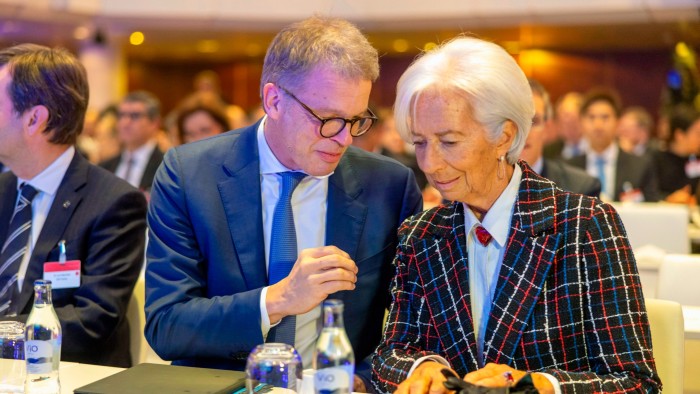Stay informed with free updates
Simply sign up to the Eurozone economy myFT Digest — delivered directly to your inbox.
The EU’s top three central bankers all sounded the alarm over economic decline on Friday, warning that political paralysis was leaving Europe even more vulnerable in a potential trade war with the US.
In a rare and strongly worded joint statement, the governors of the Bundesbank and Banque de France said the continent would be “condemned” if Germany and France cannot revive “joint French-German action”.
Meanwhile Christine Lagarde, president of the European Central Bank, gave a speech stressing the “urgency” of capital markets reform, which had not been “matched by tangible progress” despite rising risks.
She lashed out over Europe’s “extraordinarily fragmented” financial markets and implored political leaders to “bypass the vested interests that are protected like a fortress in the ancient ages”.
Joachim Nagel and François Villeroy de Galhau, the German and French central bank governors, were scheduled later on Friday to also address the Frankfurt European Banking Congress.
Their call for “joint French-German action” came in an op-ed published in Frankfurter Allgemeine Zeitung and Le Monde, which argued that Donald Trump’s US presidential election victory was likely to increase the pressure on Europe’s struggling economy and “should be taken as a wake-up call”.
Nagel and Villeroy de Galhau called for a “deepening” of Europe’s single market, a “savings and investments union” as well as less red tape and more co-operation in defence.
In a reference to the lack of Franco-German drive in these areas, the bankers warned: “To divide us would be to condemn us, and to condemn Europe.”
Both central bankers stressed that while they both supported “more common European debt” — a highly controversial topic across the region suggested by former ECB president Mario Draghi — this not “a prerequisite to move forward”. Instead, the bloc should “prioritise the many costless and more structural” options at hand.
Lagarde pointed out that there has been little progress towards a capital markets union over the past decade.
“Since 2015, there have been more than 55 regulatory proposals and 50 non-legislative initiatives, but breadth has come at the expense of depth,” adding that lobby groups managed to shoot down progress, leaving “a patchwork of national corporate, tax and securities law”.
As a consequence “capital in Europe is either trapped within national borders or leaves for the US”, she added.
Read the full article here



